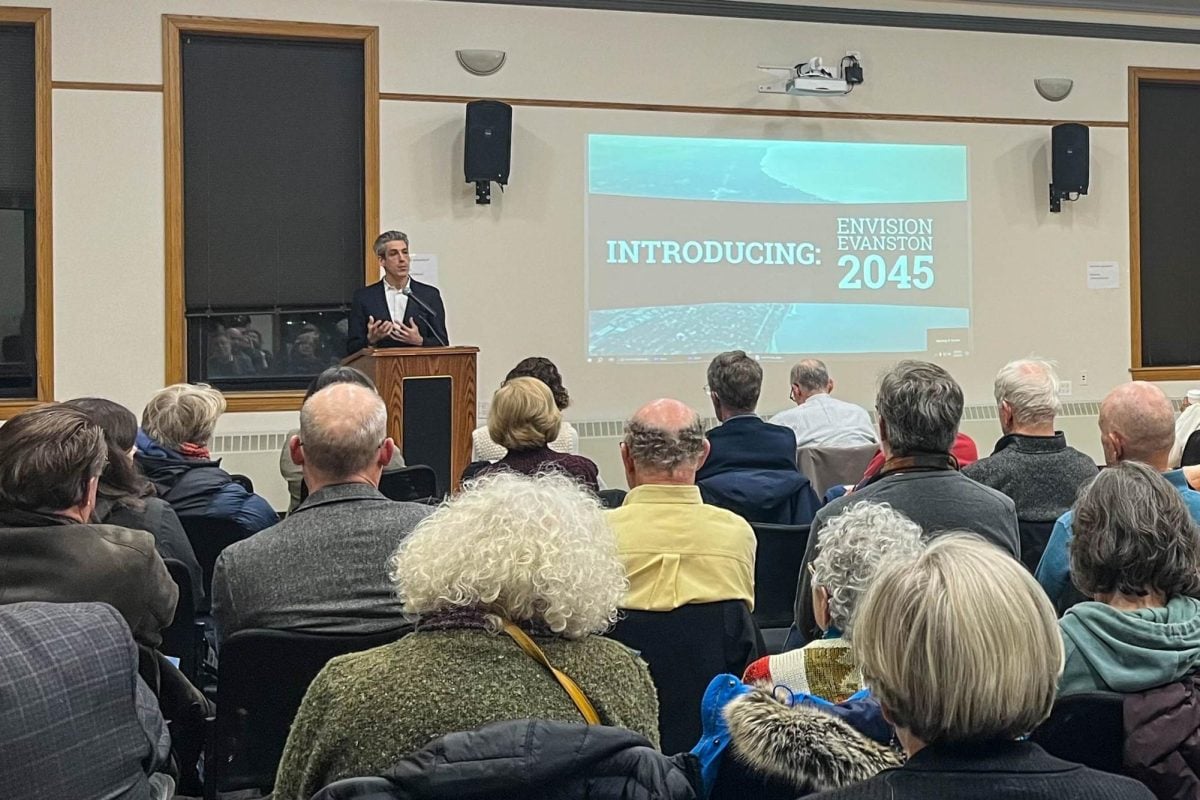City officials launched Envision Evanston 2045 — a process to create a new comprehensive plan and zoning code — during an event at the Lorraine H. Morton Civic Center Tuesday.
The new plan will include goals and strategies for improving various aspects of city life, including by maintaining public health, supporting the economy and small businesses, promoting equity and racial justice, taking action to address climate change and making housing more affordable.
Evanston’s current comprehensive plan and zoning code were approved in 2000 and 1993, respectively. New materials will provide long-term goals and guidance lasting through 2045.
While residents may not typically be thinking about specific plans and laws, Mayor Daniel Biss said Envision Evanston 2045 will enable the city to address the issues those residents do think about, like racial equity and affordable housing.
“Solving the problem has, at its root, getting this process right,” Biss said. “I know that we will only get this right if we get it together, if we do it together.”
During the event, attendees could visit various posters and place stickers and Post-it Notes indicating which changes they wanted the city to prioritize.
Evanston Township High School junior Olivia Ohlson said if young people like her participated in the planning process, future generations might better appreciate their community.
“It’s been a long time since the city has been rezoned, and it really decides what Evanston looks like and what Evanton residents get to partake in on a day-to-day basis,” she said. “So it’s really critical that everyone’s voices are put into this project.”
The plan aims to repair Evanston’s history of harmful policies that perpetuated wealth and opportunity gaps at the expense of Black residents, Biss said.
In 2019, Evanston became the first U.S. city to provide reparations for Black residents affected by discriminatory zoning laws in the past. The city determined the order in which direct descendants would receive reparations in January.
Revamping the zoning code will enable Evanston to continue addressing its history of inequitable housing practices, according to Laurice Bell, executive director of the Shorefront Legacy Center.
“Zoning is key to whether a city is considered an open or closed space to people,” she said. “So we have the chance through zoning to make Evanston a place that is welcoming — not just via its words, which can often be a facade, but via its actions.”
Michelle Redfield, co-chair of the Evanston Environment Board, hopes the plan will expand beyond the existing Climate Action and Resilience Plan so the city can reduce the impacts of climate change while achieving other goals related to issues like economic development and public health.
According to a presentation at the event, Evanston intends to draft its new comprehensive plan and zoning ordinance in August and September and hopes to adopt those documents between October 2024 and March 2025.
Evanston resident Vanessa A. Johnson-McCoy said she hopes officials will carefully review the language of existing documents, particularly the zoning ordinance, and follow through on promises to involve a wide range of community members throughout the process — including those who may not have been able to attend Tuesday’s meeting.
“(I encourage them to) be mindful, especially of those whose voices may not be loud during this process, so that they will make a special effort to get to those communities of people who rarely have their voices heard,” she said.
Email: [email protected]
Related Stories:
— Evanston residents set to receive reparations for housing discrimination
— CARP Implementation Task Force discusses 2024 requests on climate action
— Rising housing prices threaten low-income Evanston residents






